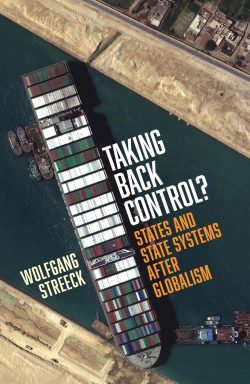Across the political aisle it seems as if neoliberalism, financial capitalism, globalization—whichever you prefer to call it—has run its course. The enemy of the United States and its residents is no longer terror in the abstract; we are now supposed to fear China for its economic might; the United States’s national identity is supposedly under attack from the migrant crisis at the US-Mexico border; and US global hegemony is beginning to fizzle much to the chagrin of media pundits and war hawks. As its economic and political might wanes, the United States has shown its unwavering commitments to supporting Israel’s genocide of Palestinians, reelecting Donald Trump, and rejecting even the most minimal steps to stop the climate crisis. The media narratives are shifting as the punditry is scrambling to make sense of inflation during the COVID-19 pandemic and the rise of right-wing authoritarianism. The situation looks grim, yet a crisis is also an opportunity, however partial, to intervene into the permanently unstable ground of our global economy.
This is perhaps the critical edge of Marxian analysis, which has historically made light of capitalism’s spectacular failures and horrendous successes. As of late, and thanks to the rightward lurch of global politics, the nation-state has made a surprising comeback. Many are ringing the bell for nationalist protectionism and an end to globalization.1See this Financial Times video about Biden’s Inflation Reduction Act as an example of this discourse. “How Biden’s Inflation Reduction Act changed the world | FT Film,” YouTube video, 27:40, posted by “Financial Times,” December 6, 2023, https://www.youtube.com/watch?v=cfaubxeS5HU. For instance, some have asked if capitalism was killed and usurped by a new era of technofeudalism, Anton Jäger has suggested the concept of “hyperpolitics” to periodize the decline of US empire, and Robert Brenner and Dylan Riley have argued for the concept of “political capitalism” to understand our trying times.2Jodi Dean, “Neofeudalism: The End of Capitalism?” Los Angeles Review of Books, May 12, 2020, https://lareviewofbooks.org/article/neofeudalism-the-end-of-capitalism/; Cédric Durand, How Silicon Valley Unleashed Techno-feudalism (New York: Verso, 2024); Yanis Varoufakis, Technofeudalism: What Killed Capitalism (New York: Melville House, 2024); MacKenzie Wark, Capital Is Dead: Is This Something Worse? (New York: Verso, 2021); Anton Jäger, “Hyperpolitics in America,” New Left Review, no. 149 (2024): 5, https://newleftreview.org/issues/ii149/articles/anton-jager-hyperpolitics-in-america; Brenner, Robert and Dylan Riley. “Seven Theses on American Politics,” New Left Review, no.138 (2022: 7), https://newleftreview.org/issues/ii138/articles/dylan-riley-robert-brenner-seven-theses-on-american-politics. While diverging on a number of points, it seems plenty clear from the literature that the state and nationalism figure prominently in today’s political landscape. With that, if we are to historicize this period adequately, it seems prudent to evaluate how Marxists theorize the state along with how they should relate to the national question.
Two recently published texts responding to the crisis that capitalist society finds itself in offer illuminating analyses for those considering the national question today. The first, an English translation of Wolfgang Streeck’s 2021 work Taking Back Control? (Zwischen Globalismus und Demokratie), mounts a study of the ways that globalism has closed off the possibility for democracy and what can be done to restore democratic control of the economy to the general populace in the twenty-first century. The second, the debut monograph from Jamie Merchant entitled Endgame, scrutinizes global economic decline and the emergence of what he calls “economic nationalism” through a Marxian lens.
These texts both analyze the majority of what some call the advanced capitalist countries—the United States, the United Kingdom, the European Union, Japan, and China—while also suggesting how economic decline breeds right-wing revolt. While both operate on distinct theoretical terrains—with Streeck showing his heritage in John Maynard Keynes and Karl Polanyi, while Merchant adheres to a communist horizon—their works offer moments of complementary analysis and points for further debate for careful readers.3For reasons I will get into below: no, Wolfgang Streeck is not the twenty-first century’s Karl Marx, as one writer argued in a recent op-ed in the New York Times. Christopher Caldwell, “This Maverick Thinker is the Karl Marx of Our Times,” New York Times, November 28, 2024, https://www.nytimes.com/2024/11/28/opinion/wolfgang-streeck-populism.html. The underlying question for both Streeck and Merchant is whether nationalism and the nation-state can be a vehicle for radical change today. This is an old question for the left, to which Streeck and Merchant offer competing answers. In the following, I offer a comparative and dynamic analysis of the argumentative lines of Taking Back Control and Endgame to, perhaps, think more dialectically about nationalism in the twenty-first century. My resulting argument is that the nation-state is an inadequate institution to solve the problems of global-economic decline. While nationalist rhetoric and appeals appear like a guiding light under the long shadow cast by globalization, such political imaginaries share liberalism’s fantasies of a rationalized world.
The rest of this review essay is organized into three sections. The first will turn to the parts or these works that analyze the conditions of capitalist accumulation in order to understand their theorization of capitalist society and the decline of globalization. The second section will then turn to their responses to this decline and elucidate their treatment of the national question within the conditions of the twenty-first century. By way of conclusion, the third section then points toward further considerations regarding the role of nationalism today.
Falling Globe, Rising Nation
Streeck and Merchant both diagnose the advanced capitalist countries’ decline in profitability and consequent decline in investment in productive labor. In the hopes of reviving these declining rates of return, a glut of speculative investments have cropped up that have shielded money from democratic control and indirectly propped up the global market.4Wolfgang Streeck, Taking Back Control? States and State Systems After Globalism (New York: Verso, 2024), 88–89; Jamie Merchant, Endgame: Economic Nationalism and Global Decline (London: Reaktion Books, 2024), 92–93. The two authors begin to diverge in their explanations of the consequences of these interlocking phenomena. For Streeck, showing his intellectual heritage from Karl Polanyi and John Maynard Keynes, the decline in profitability results in an unequal distribution of incomes and wealth which makes consumption of goods—and, therefore, the renewal of the system—nearly impossible.5Streeck, Taking Back Control, 76. For Streeck, finance capital (or neoliberalism) “has left behind massive piles of public debt and a bloated global money supply,” which leaves large swaths of money across the world in limbo, looking for a place to be reinvested profitably.6Streeck, Taking Back Control, 114. This only reinforces the unequal distribution of wealth, compelling the further centralization of industry into the hands of the few. Since money is not subject to any kind of democratic decision-making, this amounts to another way in which the capitalist system dictates the general direction of national economies in the service of the capitalist class.
Streeck extends this explanation to the political consequences of the declining profit rate by noting the right wing’s response to this receding democratic control over the economy through a rising authoritarianism. He historicizes the neoliberal counterrevolution and globalization, noting that nation-states have seen exceptional population growth, dependency on global value-chains, and financial imperialism abroad due to the increasingly unregulated financial sector. In contrast to the prevailing understanding of neoliberalism, these tendencies have led to the increasing use of the state to manage these developments. Streeck calls this authoritarian response mega-statism (Großstaateri), which he understands as the consequence of relinquishing control of national economies over to the invisible hand of the global free market. So, rather than a way to shrink the nation-state, neoliberal globalization was in fact a way for nation-states to find new avenues for competitive advantage for their own firms while aligning state capacities to protect these avenues at all costs. Yet he is clear in saying that “[t]he abolition of statehood in favour of technocracy or rule by the market…was never a real possibility” as it was always a myth in order to concretize US financial imperialism and hegemony.7Streeck, Taking Back Control, 228. According to Streeck, this contradictory dynamic makes the nation-state, as it is presently organized, an unwieldy institutional lever by which to govern society.



